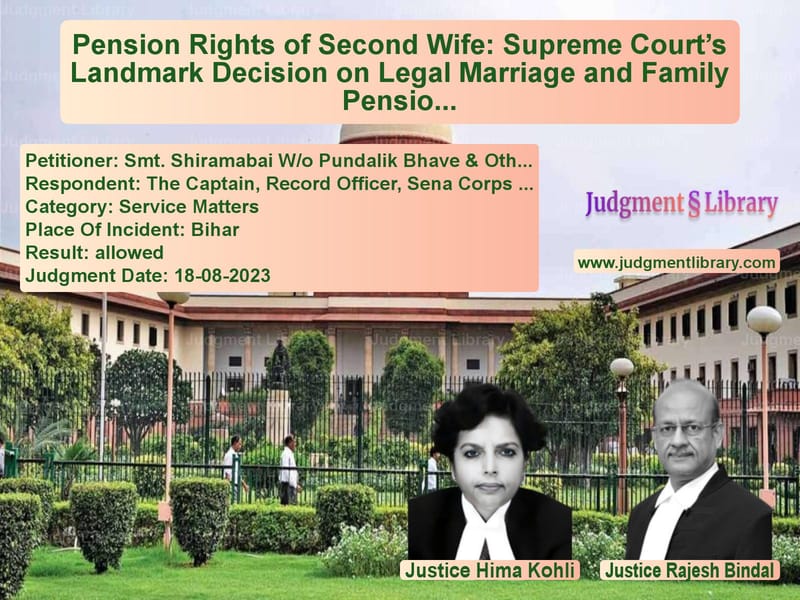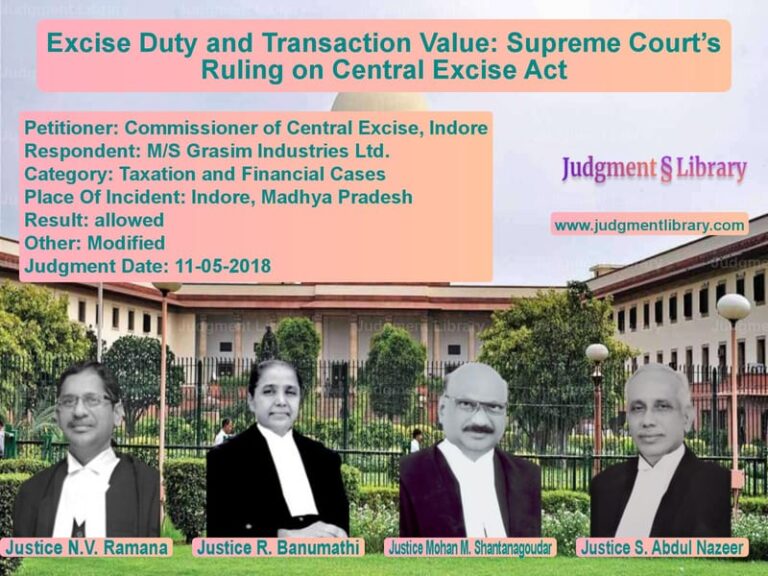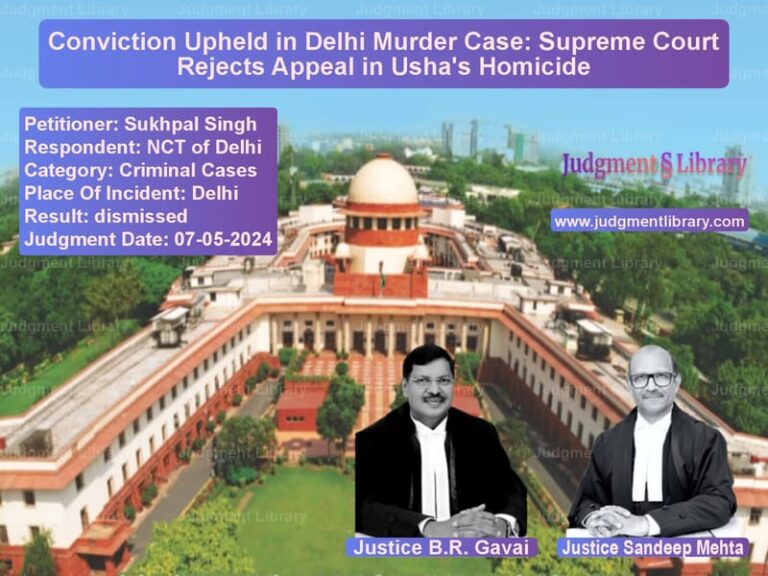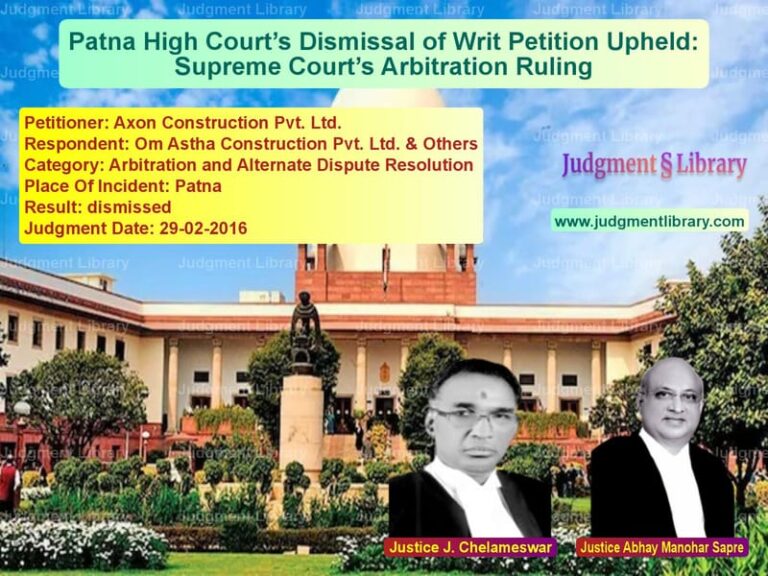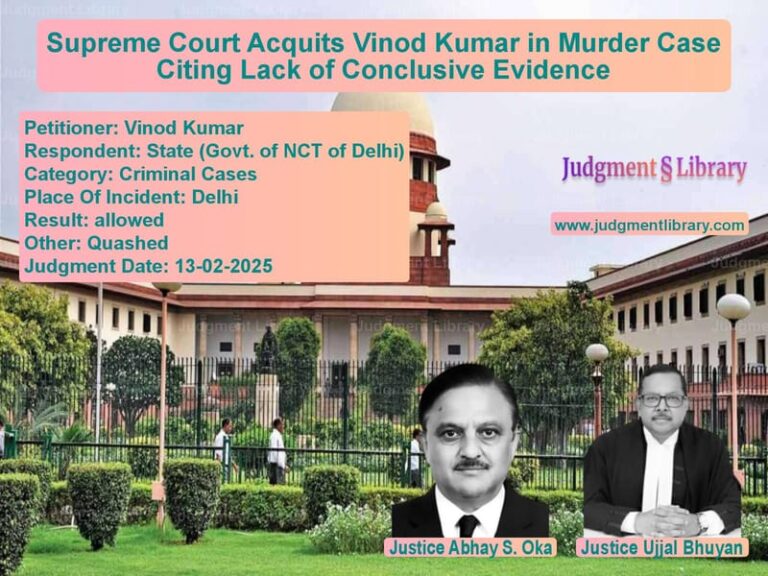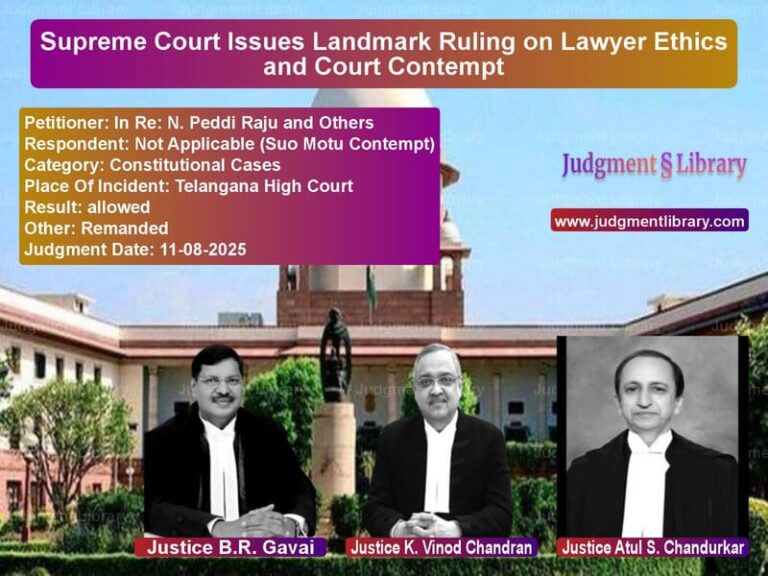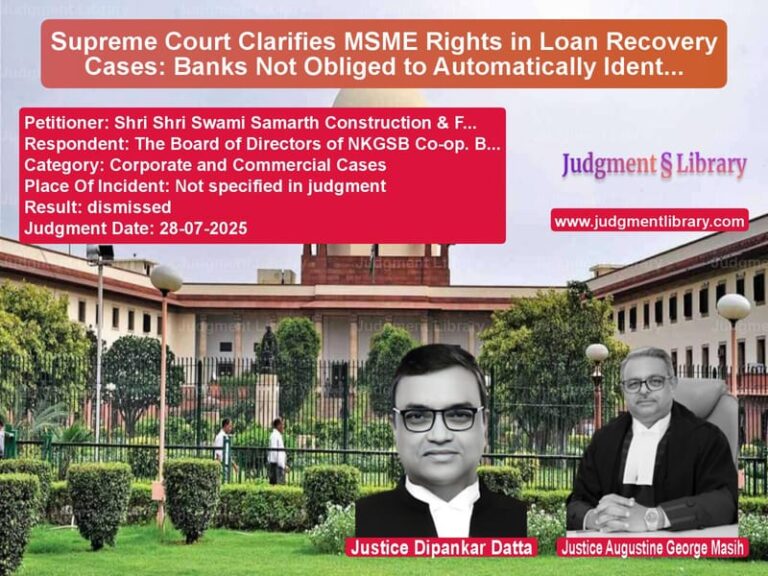Pension Rights of Second Wife: Supreme Court’s Landmark Decision on Legal Marriage and Family Pension
The Supreme Court of India recently delivered an important ruling in the case of Smt. Shiramabai W/o Pundalik Bhave & Others v. The Captain, Record Officer for O.I.C. Records, Sena Corps Abhilekh, Gaya, Bihar State & Another. The case revolved around a widow’s claim for a family pension, raising significant legal questions regarding the validity of a second marriage during the subsistence of the first and the presumption of marriage under Indian law.
Background of the Case
The dispute began with the death of Late Subedar Pundalik Bhave, a retired army officer. The appellant, Smt. Shiramabai, claimed that she was the legally wedded wife of the deceased and that her children were legitimate offspring entitled to family pension benefits. The authorities rejected her claim on the ground that her marriage had taken place while the deceased’s first wife was still alive, rendering it void under the Hindu Marriage Act, 1955.
Key facts of the case:
- Subedar Bhave initially married Smt. Parvati in 1972, who passed away in 1975.
- He then married Smt. Anusuya in 1975, during his service in the army.
- While still married to Anusuya, Bhave married Smt. Shiramabai in 1981.
- He retired from the army in 1984 and later divorced Anusuya in 1990.
- Bhave and Shiramabai lived together until his death in 2001.
- After his death, the appellant claimed family pension benefits, which were denied by the authorities.
The appellant filed a suit in 2005, which was initially decided in her favor. However, on appeal, the Karnataka High Court ruled against her, stating that her marriage was void under the Hindu Marriage Act since it took place while the first wife was still legally married to Bhave.
Legal Issues Raised
- Whether a second wife can claim family pension benefits if the marriage took place during the subsistence of the first marriage.
- Whether long cohabitation creates a presumption of valid marriage.
- Whether the children born from such a union are entitled to pension benefits.
Petitioner’s (Smt. Shiramabai) Arguments
- The appellant argued that she cohabited with the deceased for more than two decades, making her relationship legally recognized under the principle of presumption of marriage.
- She cited Section 114 of the Indian Evidence Act, which allows courts to presume certain facts, including the validity of marriage in cases of long cohabitation.
- She contended that Bhave had officially listed her as his wife in his service records after his divorce from Anusuya.
- She pointed out that the first wife, Anusuya, had never claimed a pension after Bhave’s death.
Respondent’s (Army Records Office) Arguments
- The army authorities argued that the appellant’s marriage was void under Section 5(1) of the Hindu Marriage Act, 1955, which states that a marriage is legally valid only if neither party has a living spouse at the time of marriage.
- They cited Regulation 219 of the Pension Regulations for the Army, 1961, which states that only a legally wedded wife is entitled to family pension.
- They pointed out that the appellant was aware of the existing marriage but still proceeded with the second marriage.
- The authorities contended that her claim could not override the statutory provisions governing family pensions.
Supreme Court’s Judgment
The Supreme Court ruled in favor of the appellant, recognizing the long cohabitation between the deceased and Shiramabai and applying the presumption of marriage doctrine. The Court’s key observations were:
- Presumption of Marriage: The Court cited several precedents, including Badri Prasad v. Dy. Director of Consolidation (1978) and Gokal Chand v. Parvin Kumari (1952), to reaffirm that continuous cohabitation over a long period creates a strong presumption of valid marriage.
- Legal Recognition of Cohabitation: The Court stated: “If a man and woman live together for long years as husband and wife, there arises a presumption in law in favor of the legitimacy of the marriage.”
- Effect of Divorce on Pension Entitlement: The Court noted that even if the marriage was initially void, once the first marriage was legally dissolved, the continued cohabitation strengthened the presumption of a valid marriage.
- Right to Pension Benefits: Since the deceased had officially recognized the appellant as his wife in service records, the Court ruled that she was entitled to pension benefits.
- Rights of Children: The Court also recognized the rights of the children born from this relationship to inherit the pension benefits until they reached the age of 25.
Directions Issued by the Court
- The Supreme Court set aside the High Court’s ruling and restored the trial court’s decision, granting the appellant pension benefits.
- The army authorities were directed to process her pension claim without further delay.
- The children of the deceased were granted eligibility for benefits under the army pension regulations until they reached the prescribed age limit.
Significance of the Judgment
This ruling has significant implications for family pension claims:
- Recognition of Second Marriages: The judgment provides relief to women who may have unknowingly entered into marriages that were technically void but were later legitimized through long cohabitation.
- Fair Treatment in Pension Claims: The Court ensured that procedural technicalities do not deny deserving individuals their rightful benefits.
- Impact on Service Rules: The ruling could lead to a review of pension regulations to address similar cases where legal complexities affect family pension rights.
Conclusion
The Supreme Court’s decision in Smt. Shiramabai v. The Captain, Record Officer, Sena Corps is a landmark ruling that clarifies the legal standing of second wives in pension claims. By recognizing the importance of long-term cohabitation and the rights of children born from such relationships, the judgment balances statutory regulations with equitable considerations. This ruling is expected to guide future cases involving pension claims by widows in legally complex marriages.
Petitioner Name: Smt. Shiramabai W/o Pundalik Bhave & Others.Respondent Name: The Captain, Record Officer, Sena Corps Abhilekh, Gaya, Bihar State & Another.Judgment By: Justice Hima Kohli, Justice Rajesh Bindal.Place Of Incident: Bihar.Judgment Date: 18-08-2023.
Don’t miss out on the full details! Download the complete judgment in PDF format below and gain valuable insights instantly!
Download Judgment: smt.-shiramabai-wo-vs-the-captain,-record-supreme-court-of-india-judgment-dated-18-08-2023.pdf
Directly Download Judgment: Directly download this Judgment
See all petitions in Pension and Gratuity
See all petitions in Public Sector Employees
See all petitions in Judgment by Hima Kohli
See all petitions in Judgment by Rajesh Bindal
See all petitions in allowed
See all petitions in supreme court of India judgments August 2023
See all petitions in 2023 judgments
See all posts in Service Matters Category
See all allowed petitions in Service Matters Category
See all Dismissed petitions in Service Matters Category
See all partially allowed petitions in Service Matters Category

